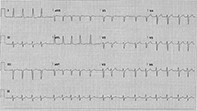John is a 68-year-old nonsmoker with stable ischaemic heart disease. Five years ago, he was infected with adenovirus and he has had stable cardiomyopathy since then. He takes apixaban 5 mg twice daily and sotalol 80 mg twice daily for prevention of atrial fibrillation. He also takes atorvastatin 40 mg daily and omega 3 and 6 fish oil supplements.
John and his wife recently spent four weeks travelling across Malaysia by car and ferry before flying home. He was bitten by mosquitoes throughout the trip. Five days before his return, he became sick with a low-grade temperature, myalgia, nausea and headache. On arrival back in Australia, he immediately presents to his GP complaining of shortness of breath and constant central chest heaviness with no radiation for the past two days.
Q1. What is the differential diagnosis of John’s shortness of breath?
The differential diagnosis in John’s case is a viral or bacterial respiratory infection, atrial fibrillation (AF), cardiac failure, myocarditis, pericardial effusion or pericarditis, acute myocardial infarction. Psychological issues such as anxiety disorders may also be the cause of his breathlessness and these are diagnoses of exclusion. A diagnosis of asthma is unlikely as he has not been diagnosed with this previously.
Q2. The GP organises an urgent ECG. What does John’s ECG show?
John’s ECG (
Figure) shows AF with a rate of 100 to 120 beats per minute and nonspecific ST changes.
Advertisement
Q3. John tests negative for dengue fever. What is Zika virus?
Zika virus is an arbovirus, similar to dengue virus, belonging to the Flaviviridae family. It is transmitted during daylight hours mainly by the female Aedes aegypti and Aedes albopictus mosquitoes and less often by other mosquito types. It is found throughout Southeast Asia, especially in areas with tropical vegetation, and also in Oceania, Central America, South America and Africa.
The incubation period of Zika virus is about three to 12 days. In most cases it causes no symptoms after infection; however, some people will develop a low-to-moderate temperature, a fine rash, viral conjunctivitis, nausea, diarrhoea, headache, myalgia and joint pains. Zika virus is best known for the complications it causes in pregnancy, when it can cause microcephaly or mental retardation in the baby, even several months after infection. It can also cause Guillain-Barré syndrome, acute myelitis and meningoencephalitis, and has now been linked to cardiac complications related to direct infection in both pregnant women and nonpregnant patients.
Q4. How is Zika virus diagnosed?
In the first week of symptoms, a serum or urine PCR test can detect the presence of Zika virus. After this time, a serum antibody test against the virus or, if necessary, paired serum antibody tests two weeks apart may be performed. However, Zika virus antibodies may cross-react with dengue virus or yellow fever virus antibodies, giving a false-positive result for those diseases instead of Zika virus.
Q5. How does Zika virus affect the heart?
Zika virus infection can cause myocarditis, as can dengue and chikungunya viruses. Acute AF, atrial tachycardia and ventricular arrhythmias have also been documented during infection. Affected patients may have a reduced ejection fraction and pericardial effusions may develop. Cardiac complications in pregnancy, such as heart block, arrhythmias and pericarditis, can occur during Zika virus infection. The complications associated with the virus typically resolve after the acute infection.
Q6. What other viral illnesses have been known to cause cardiac complications?
The common consequences of viral infections relating to the heart are cardiomyopathy, myocarditis, heart block, arrhythmias and pericarditis. Common viruses that cause cardiac complications include coxsackievirus, adenovirus, HIV, influenza virus, poliovirus and measles virus. Many other viruses can less commonly cause myocarditis, including parvovirus, Epstein-Barr virus, hepatitis B and C viruses, herpes virus, cytomegalovirus and the arboviruses.
Outcome
John was hospitalised promptly. Given that the ECG showed his AF was not fast and he was tolerating it well (no clinical evidence of cardiac failure and a normal chest x-ray), he initially was given a bolus of intravenous sotalol while further investigations were conducted. He was already taking an appropriate dose of apixaban so no further anticoagulation was needed.
John’s cardiac enzyme levels were mildly elevated, his full blood count showed a mild increase in his total white cell count with a mild lymphocytopenia and mild thrombocytopenia and he had a C-reactive protein level of 65 mg/L (normal range, <6.0 mg/L). Results of other investigations were normal.
His paired Zika virus serology later came back positive. The cardiac echocardiogram showed a reduced ejection fraction of 50% (his usual being 60%) and his AF at this time had reduced to about 90 beats per minute. He was maintained on sotalol 160 mg twice daily.
John was monitored in hospital and discharged several days later after the AF had spontaneously reverted to sinus rhythm. At this time his cardiac echocardiogram showed an ejection fraction of 60% again and his cardiac enzymes were normal. He was advised to strictly avoid mosquito bites in any future travels to Zika-affected regions. CT
COMPETING INTERESTS: None.

